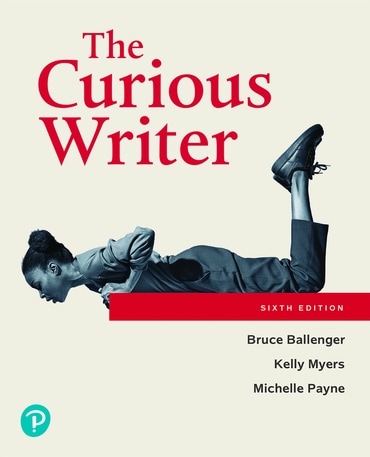
Curious Writer, The, 6th edition
- Bruce Ballenger |
- Kelly Myers |
- Michelle Payne |
Title overview
For courses in first-year composition and rhetoric.
Writing as exploratory rather than formulaic
The Curious Writer doesn't read like a textbook nor a set of guidelines for composing essays. Instead, it encourages students to suspend judgment, ask questions, and seek answers. It covers genres beyond the academic essay with a "personality" lacking in similar resources. By acting on their own curiosities, readers develop the habits of mind to become critical thinkers and writers.
The 6th Edition features 2 new coauthors and brings genre and reflection to centerstage. A series of new readings on climate change, which demonstrates writing approaches by genre, has also been added.
Hallmark features of this title
Dynamic content organized for inquiry
- The texts' 4-part inquiry-based approach introduces inquiry-based writing (Part 1); provides practice via interpretive and persuasive inquiry projects (Part 2); focuses on research (Part 3); and serves as a field guide to revision (Part 4).
- Embedded assessments check understanding and provide timely feedback along the way.
- Writing assignments foster and assess critical thinking with no significant impact on the grading burden:
- A 3-act reflection (beginning, middle and end of each chapter) prompts reflection on how to apply learning to diverse writing situations.
- Chapter-opening exercises introduce writing genres and spark discussion.
- Invention exercises (Part 2) are designed to help students find and develop topics.
- Free download: The Pearson Guide to the 2021 MLA Handbook.
New and updated features of this title
Focus on genre and re-genre
- EXPANDED: Students learn about re-genre when challenged to transform a completed writing assignment into a multimedia project in just one of many innovative projects included (e.g., social media campaigns, movie trailers, etc.).
- NEW: A new series of readings about climate change (including one reading per genre chapter in Part 2) demonstrates how different genres might approach the same question.
Development of critical writing and reading skills
- EXPANDED: Reflection is a major focus of the new edition. Students are encouraged to consider how they can use what they're learning to improve their writing approach.
- UPDATED: A stronger focus on argumentative writing is buoyed by a revised Chapter 9 and the restructuring of Part 2 assignments with interpretive inquiry and persuasive inquiry.
- REVISED: Updated coverage includes a new description of the process of "binocular" reading that encourages students to approach difficult texts through a personal and rhetorical lens; revised learning objectives and end-of-chapter assessments (with notes throughout each chapter highlighting where the objectives come into play); and Part 2, which is project-based, has been restructured into 2 types of inquiry projects: interpretative inquiry and persuasive inquiry.
Key features
Features of Revel for the 6th Edition
- A multimedia example for each writing genre appears in each chapter, keeping with the focus on how genre influences what and to whom we write.
- The audio playlist features Navigating The Curious Writer, in which the authors reinforce key concepts in the middle of a chapter while preparing students for what's to come.
Table of contents
PART 1: THE SPIRIT OF INQUIRY
- Writing as Inquiry
- Reading as Inquiry
PART 2: INQUIRY PROJECTS
- Writing a Personal Essay
- Writing a Profile
- Writing an Ethnographic Essay
- Writing an Analytical Essay
- Writing a Review
- Writing a Proposal
- Writing an Argument
PART 3: INQUIRING DEEPER
- Writing a Research Essay
- Research Strategies
- Using and Citing Sources
PART 4: RE-INQUIRING
- Re-Genre: Repurposing Your Writing for Multimedia Genres
- Revision Strategies
APPENDICES
- The Writer's Workshop
- The Writing Portfolio
- The Annotated Bibliography
Author bios
About our authors
Bruce Ballenger is an emeritus professor of English at Boise State University, where he taught courses in composition, composition theory, the essay tradition and creative nonfiction. He's the author of seven books, including the three texts in the Curious series: The Curious Researcher, The Curious Reader, and The Curious Writer, all from Pearson Education. His text Crafting Truth: Short Studies in Creative Nonfiction is from the same publisher. He is thrilled to be joined by his colleagues, Drs. Kelly Myers and Michelle Payne, in writing the 6th edition of this book.
Kelly Myers, associate professor of English at Boise State University, teaches argument and rhetoric courses, nonfiction workshops and capstone courses. She writes about revision strategies, opportunity and regret. She also works with undergraduate students to design and implement student success initiatives across the university. The Curious Writer was the textbook she used in her first semester of teaching, twenty years ago, and she feels honored to contribute to a book she loves.
Michelle Payne is a professor of English at Boise State University and assistant provost for Academic Leadership and Faculty Affairs. She teaches courses in nonfiction writing, argument and composition theory. She is the author of Bodily Discourses: When Students Write about Abuse and Eating Disorders and coauthor of The Curious Reader with Bruce Ballenger. She has also written the instructor manual for each edition of The Curious Writer and has enjoyed being a thinking partner with Bruce on the textbook over the years.